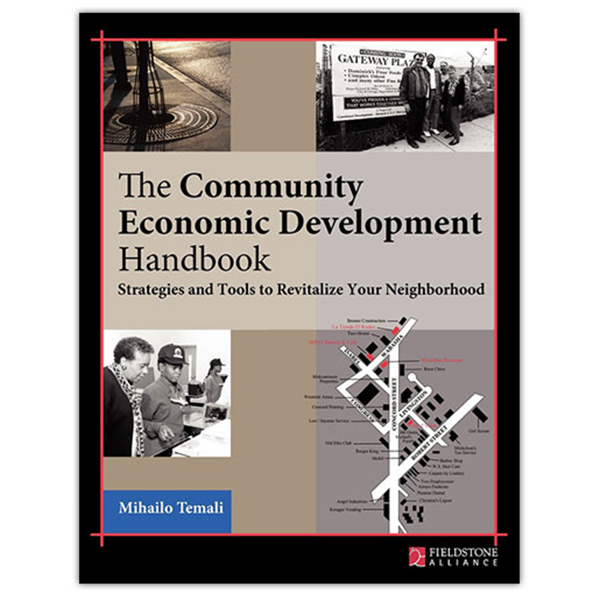Description
Comprehensive, realistic, and easy-to-use, The Community Economic Development Handbook is just what you need to turn a neighborhood or business district around.
Author Mihailo Temali has distilled over twenty years of experience in community-based economic development into this practical, jargon-free handbook which describes a proven way to make any community a better place to live and work.
Temali focuses on what he calls a “pivot point strategy” to start or expand economic development. The four pivot points are:
- Revitalizing your commercial district
- Developing microbusinesses
- Developing your community workforce
- Growing neighborhood jobs.
Temali explains how to choose your first pivot point, then guides you through the process of tackling each one.
Stories of successful community economic development provide inspiration. Sidebars explore related issues such as dealing with gentrification, finding potential partners, supporting microentrepreneurs, and more. Professionals share their insights from the field. And appendices point you toward useful resources, show you how to use the Internet to research your regional economy, and include dozens of worksheets that will help you put the material in the book into action.
Table of Contents
- Community Economic Development, An Overview
- Two goals of community economic development
- Your vehicle to meet those goals
- Four pivot-point strategies
- A four-step process
- Opening your toolbox
- Getting the most from this book
- Summary
- Develop Your Organization
- Review the types of community economic development organizations
- Handle basic start-up tasks
- Establish basic operating principles
- Build your funding
- Build your staff
- Develop and maintain strong relationships
- Create effective partnerships
- Gain visibility and credibility
- Summary
- Pick A Pivot Point And Get Started
- Assess current economic conditions
- Assess your organization’s resources
- Choose a pivot-point strategy
- Tips for creating your vision and strategic plan
- Tips for implementing your plan
- Tips for evaluating and improving your work
- Summary
- Revitalize Your Commercial District
- Forces that drive districts down
- The case for revitalizing your commercial district
- Step 1: assess current conditions
- Step 2: create a vision and strategic plan
- Step 3: implement your plan
- Step 4: monitor, evaluate, and improve
- Summary
- Develop Microbusinesses
- Three reasons to see microbusiness as an economic pivot point
- Understand microentrepreneurs
- Step 1: assess current conditions
- Step 2: create a vision and strategic plan
- Step 3: implement your plan
- Step 4: monitor, evaluate, and improve
- Summary
- Develop Your Community Workforce
- Understand the workforce development industry
- Common elements in workforce development programs
- Seven common approaches to workforce development
- Step 1: assess current conditions
- Step 2: create a vision and strategic plan
- Step 3: implement your plan
- Step 4: monitor, evaluate, and improve
- Summary
- Grow Good Neighborhood Jobs
- Examples of neighborhoods growing good jobs
- Pre-assessment: define the features of a job-producing business
- Step 1: assess current conditions
- Step 2: create a vision and strategic plan
- Step 3: implement your plan
- Step 4: monitor, evaluate, and improve
- Summary
- Conclusion
- Appendices
- Index
About the Author
Mihailo Temali is the founder, President, and CEO of the Neighborhood Development Center (NDC). NDC was formed as a non-profit, and blends approaches of international micro enterprise and domestic community development. In his role with NDC, Mr. Temali develops and manages NDC’s network of partnerships, small business training, lending, technical assistance and business incubator development programs for inner-city low income entrepreneurs. NDC plays the lead role in development and management of six business incubators.

